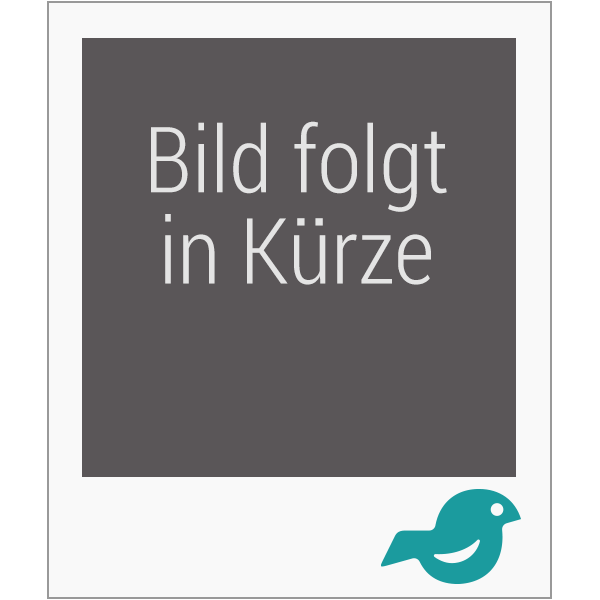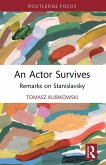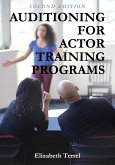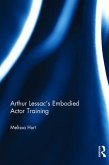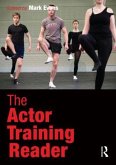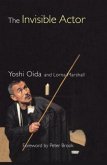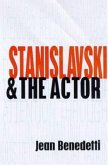Stanislavsky and Screen Actor Training
Herausgeber: Stamatiou, Evi; Carnicke, Sharon Marie
Stanislavsky and Screen Actor Training
Herausgeber: Stamatiou, Evi; Carnicke, Sharon Marie
- Broschiertes Buch
- Merkliste
- Auf die Merkliste
- Bewerten Bewerten
- Teilen
- Produkt teilen
- Produkterinnerung
- Produkterinnerung
Stanislavsky and Screen Actor Training is a collection of essays mapping the acting field's current engagement with Stanislavsky practices and concepts for training in the screen industries across continents.
Andere Kunden interessierten sich auch für
![An Actor Survives An Actor Survives]() Tomasz KubikowskiAn Actor Survives31,99 €
Tomasz KubikowskiAn Actor Survives31,99 €![Auditioning for Actor Training Programs Auditioning for Actor Training Programs]() Elizabeth TerrelAuditioning for Actor Training Programs51,99 €
Elizabeth TerrelAuditioning for Actor Training Programs51,99 €![Arthur Lessac's Embodied Actor Training Arthur Lessac's Embodied Actor Training]() Melissa HurtArthur Lessac's Embodied Actor Training60,99 €
Melissa HurtArthur Lessac's Embodied Actor Training60,99 €![The Actor Training Reader The Actor Training Reader]() The Actor Training Reader69,99 €
The Actor Training Reader69,99 €![John McCullough As Man, Actor And Spirit (1905) John McCullough As Man, Actor And Spirit (1905)]() Susie Champney ClarkJohn McCullough As Man, Actor And Spirit (1905)22,99 €
Susie Champney ClarkJohn McCullough As Man, Actor And Spirit (1905)22,99 €![The Invisible Actor The Invisible Actor]() Yoshi OidaThe Invisible Actor50,99 €
Yoshi OidaThe Invisible Actor50,99 €![Stanislavski and the Actor Stanislavski and the Actor]() Jean BenedettiStanislavski and the Actor31,99 €
Jean BenedettiStanislavski and the Actor31,99 €-
-
-
Stanislavsky and Screen Actor Training is a collection of essays mapping the acting field's current engagement with Stanislavsky practices and concepts for training in the screen industries across continents.
Produktdetails
- Produktdetails
- Verlag: Taylor & Francis Ltd
- Seitenzahl: 212
- Erscheinungstermin: 17. Dezember 2025
- Englisch
- Abmessung: 234mm x 156mm
- Gewicht: 453g
- ISBN-13: 9781032986081
- ISBN-10: 1032986085
- Artikelnr.: 74778524
- Herstellerkennzeichnung
- Libri GmbH
- Europaallee 1
- 36244 Bad Hersfeld
- gpsr@libri.de
- Verlag: Taylor & Francis Ltd
- Seitenzahl: 212
- Erscheinungstermin: 17. Dezember 2025
- Englisch
- Abmessung: 234mm x 156mm
- Gewicht: 453g
- ISBN-13: 9781032986081
- ISBN-10: 1032986085
- Artikelnr.: 74778524
- Herstellerkennzeichnung
- Libri GmbH
- Europaallee 1
- 36244 Bad Hersfeld
- gpsr@libri.de
Evi Stamatiou is a practitioner-researcher of actor training, bringing two decades of international experience as an actor and creative. She is a Senior Lecturer in Acting for Stage and Screen at the University of East London and holds a PhD from The Royal Central School of Speech and Drama, University of London, UK. A recipient of multiple awards and research grants, she is also a Senior Fellow of the Higher Education Academy and currently serves as Chair of the Acting Program at the Association for Theatre in Higher Education. Evi's interdisciplinary work bridges acting with technology, education, psychology, and health sciences-advancing inclusive actor training and exploring the broader applications of acting in human development. Sharon Marie Carnicke is best known for her groundbreaking study, Stanislavsky in Focus. Her other books include the recent Dynamic Acting through Active Analysis, Anton Chekhov: 4 Plays and 3 Jokes, and Checking out Chekhov. She has also published widely on screen performance and co-authored Reframing Screen Performance with Cynthia Baron. As a teacher of acting, she has conducted many intensive workshops on Active Analysis in the US, Europe, and Scandinavia. She is currently Professor of Dramatic Arts and Slavic Studies at the University of Southern California, USA, and founder of the Stanislavsky Institute for the 21st century.
Introduction
A. Positioning The Anthology Within Contemporary Screen Actor Training
B. Stanislavsky on Cinema and Film Acting
Part 1: Stanislavsky's concepts in the screenacting studio
1. Visualization: Stanislavsky and Rosenstein on Fostering Imagination and
Concentration
2. "Fragmented" Radiation [Izlucheniya] for Camera
3. Accessing Stanislavsky's state of 'experiencing' [Perezhivanie] for the
screen actor
4. Presence [Prisutstviye] Without Rehearsal: States of Being in Daily
Television Production
Part 2: Active Analysis in the screenacting studio
5. Prompting Inner Monologue through Active Analysis
6. Embodying Active Analysis and Inner Monologue for the Screen
7. Reimagining Active Analysis: Cultivating Spontaneous Actor Responses for
the Screen
Part 3: Adapting Stanislavsky for screenacting processes
8. Exploring Internal vs. External Tempo-Rhythm: Live-Editing in Screen
Acting Training
9. The Film Actor Prepares with Michael Chekhov and SynthAnalysis(TM)
10. In-Camera Études: Delivering Purposeful, Precise, and Readable
Performances in Every Take
Part 4: Pedagogical Innovations Inspired by Stanislavsky
11. Discovering Sensorial Shakespeare Through Language and Focal Points
12. Bridging Practices: Enhancing Mike Leigh's Method Through
Stanislavsky's Tools
13. Ethnoacting in VR for Resilience in Screen Actors: a
Vakhtangov-inspired intervention
Index
A. Positioning The Anthology Within Contemporary Screen Actor Training
B. Stanislavsky on Cinema and Film Acting
Part 1: Stanislavsky's concepts in the screenacting studio
1. Visualization: Stanislavsky and Rosenstein on Fostering Imagination and
Concentration
2. "Fragmented" Radiation [Izlucheniya] for Camera
3. Accessing Stanislavsky's state of 'experiencing' [Perezhivanie] for the
screen actor
4. Presence [Prisutstviye] Without Rehearsal: States of Being in Daily
Television Production
Part 2: Active Analysis in the screenacting studio
5. Prompting Inner Monologue through Active Analysis
6. Embodying Active Analysis and Inner Monologue for the Screen
7. Reimagining Active Analysis: Cultivating Spontaneous Actor Responses for
the Screen
Part 3: Adapting Stanislavsky for screenacting processes
8. Exploring Internal vs. External Tempo-Rhythm: Live-Editing in Screen
Acting Training
9. The Film Actor Prepares with Michael Chekhov and SynthAnalysis(TM)
10. In-Camera Études: Delivering Purposeful, Precise, and Readable
Performances in Every Take
Part 4: Pedagogical Innovations Inspired by Stanislavsky
11. Discovering Sensorial Shakespeare Through Language and Focal Points
12. Bridging Practices: Enhancing Mike Leigh's Method Through
Stanislavsky's Tools
13. Ethnoacting in VR for Resilience in Screen Actors: a
Vakhtangov-inspired intervention
Index
Introduction
A. Positioning The Anthology Within Contemporary Screen Actor Training
B. Stanislavsky on Cinema and Film Acting
Part 1: Stanislavsky's concepts in the screenacting studio
1. Visualization: Stanislavsky and Rosenstein on Fostering Imagination and
Concentration
2. "Fragmented" Radiation [Izlucheniya] for Camera
3. Accessing Stanislavsky's state of 'experiencing' [Perezhivanie] for the
screen actor
4. Presence [Prisutstviye] Without Rehearsal: States of Being in Daily
Television Production
Part 2: Active Analysis in the screenacting studio
5. Prompting Inner Monologue through Active Analysis
6. Embodying Active Analysis and Inner Monologue for the Screen
7. Reimagining Active Analysis: Cultivating Spontaneous Actor Responses for
the Screen
Part 3: Adapting Stanislavsky for screenacting processes
8. Exploring Internal vs. External Tempo-Rhythm: Live-Editing in Screen
Acting Training
9. The Film Actor Prepares with Michael Chekhov and SynthAnalysis(TM)
10. In-Camera Études: Delivering Purposeful, Precise, and Readable
Performances in Every Take
Part 4: Pedagogical Innovations Inspired by Stanislavsky
11. Discovering Sensorial Shakespeare Through Language and Focal Points
12. Bridging Practices: Enhancing Mike Leigh's Method Through
Stanislavsky's Tools
13. Ethnoacting in VR for Resilience in Screen Actors: a
Vakhtangov-inspired intervention
Index
A. Positioning The Anthology Within Contemporary Screen Actor Training
B. Stanislavsky on Cinema and Film Acting
Part 1: Stanislavsky's concepts in the screenacting studio
1. Visualization: Stanislavsky and Rosenstein on Fostering Imagination and
Concentration
2. "Fragmented" Radiation [Izlucheniya] for Camera
3. Accessing Stanislavsky's state of 'experiencing' [Perezhivanie] for the
screen actor
4. Presence [Prisutstviye] Without Rehearsal: States of Being in Daily
Television Production
Part 2: Active Analysis in the screenacting studio
5. Prompting Inner Monologue through Active Analysis
6. Embodying Active Analysis and Inner Monologue for the Screen
7. Reimagining Active Analysis: Cultivating Spontaneous Actor Responses for
the Screen
Part 3: Adapting Stanislavsky for screenacting processes
8. Exploring Internal vs. External Tempo-Rhythm: Live-Editing in Screen
Acting Training
9. The Film Actor Prepares with Michael Chekhov and SynthAnalysis(TM)
10. In-Camera Études: Delivering Purposeful, Precise, and Readable
Performances in Every Take
Part 4: Pedagogical Innovations Inspired by Stanislavsky
11. Discovering Sensorial Shakespeare Through Language and Focal Points
12. Bridging Practices: Enhancing Mike Leigh's Method Through
Stanislavsky's Tools
13. Ethnoacting in VR for Resilience in Screen Actors: a
Vakhtangov-inspired intervention
Index

